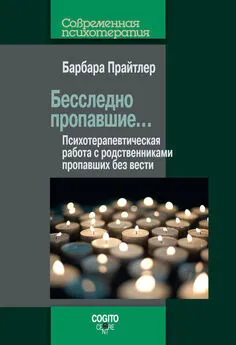Барбара Прайтлер - Бесследно пропавшие… Психотерапевтическая работа с родственниками пропавших без вести
- Название:Бесследно пропавшие… Психотерапевтическая работа с родственниками пропавших без вести
- Автор:
- Жанр:
- Издательство:Литагент «Когито-Центр»881f530e-013a-102c-99a2-0288a49f2f10
- Год:2015
- Город:Москва
- ISBN:978-5-89353-452-8, 978-3-89806-928-1
- Рейтинг:
- Избранное:Добавить в избранное
-
Отзывы:
-
Ваша оценка:
Барбара Прайтлер - Бесследно пропавшие… Психотерапевтическая работа с родственниками пропавших без вести краткое содержание
В книге обсуждается целый спектр проблем, касающихся процесса скорби и преодоления травмы у людей, чьи родственники пропали без вести – стали жертвами «насильственного исчезновения» в результате войн, обострения политической обстановки или же пропали вследствие стихийного бедствия. Изложены теоретические основы этой новой области исследования и дан исторический обзор событий ХХ века, в которых феномен насильственных исчезновений проявился с особой остротой. Изложен многолетний практический опыт психотерапии родственников пропавших без вести в различных сеттингах, включая работу в кризисных точках (войны, теракты, природные катастрофы). Особое внимание уделяется коллективным стратегиям преодоления травматических переживаний при бесследном исчезновении близких людей и вопросам самопомощи и психогигиены профессионалов, оказывающих им психологическую помощь.
Бесследно пропавшие… Психотерапевтическая работа с родственниками пропавших без вести - читать онлайн бесплатно ознакомительный отрывок
Интервал:
Закладка:
Agosin M. (1992). Circles of Madness. Mothers of the Plaza de Maya. N. Y.: White Pine Press.
Agosin M. (1993). Surviving Beyond Fear. Women, Children and Human Rights // Agosin M. (Ed.). Latin America. N. Y.: White Pine Press, 98-125.
AHRC (2006). Sri Lanka: 20 forced disappearances reported in December 2005.
Urgent Action 017-2005, Hongkong: Asian Human Right Commission.
Ainsworth M. et al. (1978). Patterns of Attachment. Hillsdale: Erlbaum.
American Psychiatric Association (1980/1994). Diagnostic and statistical manual of mental disorders. Washington: APA.
Améry J. (1989). At the Mind's Limits: Contemplations by a Survivor on Auschwitz and its Realities. Bloomington: Indiana University Press.
Amnesty International (1982)…nicht die Erde hat sie verschluckt. Bonn: Amnesty International.
Amnesty International (1993a). Getting away with murder. Political killings and ‘disappearances' in the 1990s. London: Amnesty International Publications.
Amnesty International (1993b). 14-Point Program for the Prevention of «Disappearances» February 1993. http://www.amnesty.org/en/library/info/POL36/001/1993
Amnesty International (1996). Latin America Crime without Punishment: Impunity in Latin America. London: Amnesty International Publications.
Amnesty International (1997). Sri Lanka. Government's response to widespread ‘disappearances' in Jaffna. ASA 37/24/97.
Amnesty International (1998). urgent action, 78, 11. March 1998. London: Amnesty International.
Amnesty International. (2002). Amnesty International Report 2002: Russian Federation. May 2002. http://www.refworld.org/docid/3cf4bc12c.html
Amnesty International (2010). Ein Leben in Angst und Ungewissheit. Verschleppung, Geheimhaft und politischer Mord. http://www.amnesty.at/informiert_sein/ein_leben_in_angst_und_ungewis-sheit/ (accessed on 10.7.2013)
Amnesty International (2012). Jetzt Gerechtigkeit für die Familie Matanovic fordern. http://www.amnesty.at/index.php?id=1827. (accessed on 4.9.2012)
Ansary M. (2003). Flieh, bevor der Morgen graut. Die Geschichte einer iranischen Frau. Bergisch Gladbach: Ehrenwirth.
Antonovsky A. (1987). Unraveling the mystery of health. How people manage stress and stay well. San Francisco: Jossey-Bass.
Antonovsky A. (1997). Salutogenese. Zur Entmystifizierung der Gesundheit. Tübingen: dgvt Verlag.
Ashenberg Straussner S., Kolko Phillips N. (2004). Understanding Mass Violence. A Social Work Perspective. Boston: Pearson.
Asian Human Rights Commission (1999). Sri Lanka: Disappearances and the Collapse of the Police System. Hongkong: AHRC Eigenverlag.
Asian Human Right Group (AHRC) (2013). SRI LANKA: Whose remains are in the mass grave at Matale. Hongkong: AHRCSTM-083-2013
Auerhahn N. C., Laub D. (1988). Intergenerational Memory of the Holocaust // Danieli Y. (Ed.): International Handbook of Multigenerational Legacies of Trauma. N. Y.: Plenum Press, 21–42.
Baker E. K. (2002). Crying for Ourselves. A Therapist's Guide to personal and Professional Well Being. Washington: American Psychological Association.
Ball P. (2005). Mass graves are not necessary for tsunami victims. In: Nature. International weekly journal of sience. Online. Published on 7.1.2005. http://www.nature.com/news/2005/050103/full/news050103-10.html
Baradaran M. (1998). Erwachen aus dem Alptraum. Zürich: Unionsverlag.
Bayer O. (2001). Die Schatten der Verschwundenen. Die Diktatur in Argentinien und ihre Folgen // Müller-Hohagen J. (Ed.). Stacheldraht und heile Welt. Tübingen: Edition Diskord.
BBC (2004). Hidden graves. http://news.bc.co.uk/1/hi/world/south_asia/125691.stm
Becker D. (1992). Ohne Haß keine Versöhnung. Das Trauma der Verfolgten. Feiburg i. Br.: Kore.
Becker D. (2006). Die Erfindung des Traumas – Verflochtene Geschichten. Berlin: Freitag.
Becker D., Weyermann B. (2006). Gender, Konflittransformation & psychosozialer Ansatz. http://www.deza.admin.ch/ressources/resource_en_91135.pdf
Becker E. (1973). The Denial of Death. N. Y.: Simon and Schuster.
Beckermann R. (1989). Unzugehörig. Österreicher und Juden nach 1945. Wien: Löcker Verlag.
Benedek E. D. (1985). Children and Disaster: Emerging Issues. Psychiatric Annuals, 15 (3), 168–172.
Benson D. et. al. (1975). Waiting: The Dilemma of the MIA Wife // Hamilton I., Mccubbin et. al. (Eds). Family Separation and Reunion. Families of Prisoners of War and Servicemen Missing in Action. Washington, D. C: U. S. Government Printing Office, 157–168.
Benz W. (1995). Der Holocaust. München: Beck.
Bettelheim B. (1980). Erziehung zum Überleben. Zur Psychologie von Extremsituationen. Stuttgart: Deutscher Taschenbuchverlag.
Bittenbinder E. (2000). Trauma und extreme Gewalt – Systemische Psychotherapie mit Überlebenden von Folter und die Bedeutung «innerer Bilder». Psychotherapie im Dialog, 1, 38–44.
Black L. (1999). Forced Disappearances in Sri Lanka Constitute a Crime Against Humanity. URL: www.disappearances.org/mainfile.php/articles_srilanka/9/?print=yes
Blos P. (1979). Adolescent Passage. N. Y.: International Universities Press
Böhme K. W. (1965). Gesucht wird… Die dramatische Geschichte des Suchdienstes. München: Süddeutscher Verlag.
Boss P. (1999). Ambiguous Loss. Learning to Live with Unresolved Grief. Cambridge u. a.: Harvard University Press.
Boss P., Beaulieu L., Wieling E., Turner W, LaCruz S. (2003). Healing Loss, Ambiguity and Trauma: A Community-Based Intervention With Families of Union Workers Missing After the 9/11 Attack in New York City. Journal of Marital and Family Therapy, 29, 455-467
Boss P. (2006). Loss, Trauma and Resilience: Therapeutic Work with Ambiguous Loss. N. Y: Norton.
Boulanger G. (2007) Wounded by Reality. Understanding and Treating Adult Onset Trauma. Mahwah, London: The Analytic Press.
Bouvard M. G. (1994). Revolutionizing Motherhood. The Mothers of the Plaza de Maya. Wilmington D. E.: Scholarly Resources Inc.
Bowlby J. (1958). The nature of the child's tie to his mother // International Journal of Psychoanalysis. 38, 350–373.
Bowlby J. (1961). Childhood mourning and Its Implications for Psychiatry // Am. J. of Psychiatry. 118, 481–498.
Bowlby J. (1969). Attachment and Loss. N. Y.: Basic Books.
Bowlby J. (1980). Loss, Sadness and Depression. N. Y.: Basic Books.
Bowlby J. (1983). Verlust. Trauer und Depression. Frankfurt a. M. Fischer.
Bracken P. J., Petty C. (1998). Rethinking the Trauma of War. London, N. Y.: Free Association Books.
Brkic C. A. (2004). Eyewitness: Unearthing Bosnia's dead. http://news.bbc.co.uk/1/hi/world/europe/3975599.stm
Brune M. (2010). Wenn Verbrechen nicht gesühnt werden – Reflexionen zur Psychotherapie mit Opfern lateinamerikanischer Diktaturen // Ottomeyer K., Preitler B., Spitzer H. (Eds). Look I am a Foreigner. Interkulturelle Begegnung und psychosoziale Praxis auf fünf Kontinenten. Klagenfurt: Drava, 49–60.
Butalia U. (o. A.). Abducted and Widowed Women. Questions of Sexuality and Citizenship During Partition. http://jan.ucc.nau.edu/~sj6/butaliaabductedwomen.pdf
Butollo W., Krüsmann M., Hagl M. (1998): Leben nach dem Trauma. Über den therapeutischen Umgang mit dem Entsetzen. München: Pfeiffer.
Castaneda O. (2013). Scarfs of Hope as a Warm and Performative Memorial of the Disappeared in Peru. Critica Latinoamericana. http://criticalatinoamericana.com/316/
Childline (n. g.). http://www.childlineindia.org.in/missing-children-india.htm
Comite International ICRC (1996). Missing Persons on the Territory of Bosnia and Herzegovina. Geneve: Red Cross; Eigenverlag 30.5.1996
Damian, S. (1987). The Psychotherapeutic Approach to the Psychological Sequel of Civil War in the District of Jaffna (unpublished Typescript)
Danieli Y. (Ed.). (1998). International Handbook of Multigenerational Legacies of Trauma. N. Y.: Plenum Press.
Das V. (2002). Nationale Ehre und praktizierte Verwandtschaft. Unerwünschte Frauen und Kinder nach der Trennung Pakistans von Indien // Duden. B., Noeres D. (Eds). Auf den Spuren des Körpers in einer technogenen Welt. Opladen: leske + budrich, 77–102.
Deutsches Rotes Kreuz. (8. edition., 1988). Die Genfer Rotkreuz-Abkommen vom 12. August 1949 und die Beiden Zusatzprotokolle vom 8. Juni 1977. Bonn: Schriften des Deutschen Roten Kreuzes
De Jong J. (2002). Trauma, War, and Violence. Public Mental Health in Socio-Cultural Context. N. Y.: Kluwer Academic.
Der Standard (2004). Fischgerichte derzeit tabu. Der Standard., 3.1.2004, 4.
De Soysa P. (2001). Conflict-related trauma in an Asian country: a report from Sri Lanka // International Review of Psychiatry. 13, 201–208.
Devereux G. (1984). Angst und Methode in den Verhaltenswissenschaften. Frankfurt a. M.: Suhrkamp Taschenbuch.
De Wind E. (1968). The Confrontation with Death // International Journal of Psycho-Analysis, 49, 302–305.
De Zoysa P. (2001). Conflict-related Trauma in an Asian country: a report from Sri Lanka. International Review of Psychiatry. 13, 201–208.
Diner D. (Ed.) (1988). Zivilisationsbruch. Denken nach Auschwitz. Frankfurt a. M.: Fischer.
Domansky E. (1997). A lost war. World War II in Postwar German Memory // Rosenfeld A. H. (Ed.). Thinking about the Holocaust. Bloomington, Indianapolis: Indiana University Press., 233–272.
Durst N. (1999). Psychotherapeutisches Arbeiten mit Überlebenden des Holocaust. Zeitschrift für Politische Psychologie, 7/1+2, 101–112.
Duras M. (1985). Der Liebhaber. Frankfurt a. M.: Suhrkamp
Edelman L., Kordon D., Lagos D. (1998). Transmission of Trauma. The Argentine Case // Danieli Y. (Ed.). International Handbook of Multigenerational Legacies of Trauma. N. Y: Plenum Press, 447–463.
Edelman L., Kersner D., Kordon D., Lagos D. (2003). Psychosocial Effect and Treatment of Mass Trauma Due to Sociopolitical Events: The Argentine Experience // Krippner S., McIntyre T. M. (Eds).
The psychological impact of war trauma on civilians: an international perspective. Westport: Prager Publishers, 143–153.
Erikson E. H. (1968). Identity, Youth and Crisis. N. Y.: Norton.
Extraordinary Chambers in the Courts of Cambodia (2012). http://www.eccc.gov.kh (accessed on 18.10.2012)
Eyer D. E. (1992). Mother-Infant Bonding. New Haven: Yale University Press.
FEDEFAM (2004): Fighting Against Forced Disappearances in Latin America. http://www.desaparecidos.org/fedefam/eng.html
Fernando B. (1998). Disappearances: A Matter of Survival of Society and the Country. Christian Worker 2, 6-11.
Fernando B. (2004). The Right to Speak Loudly. Essays on Law and Human Rights. Hongkong: Asian Legal Resource Centre.
Fink I. (1996): Die Reise. Frankfurt a. M.: Fischer.
Fischer J. (1989). Mothers of the Disappeared. Boston: South End Press.
Foa E. B. (1998). Treating the trauma of rape: cognitive-behavioral therapy for PTSD. N. Y.: Guilford Press.
Freeman J. (2012). Khmer Rouge survivors risk prolonged grief disorder. The Phnom Penh Post. 4.10. 2012
Freud S. (1914/16). The Standard Edition of the Complete Psychological Work of Sigmund Freud. London: The Hogarth Press.
Freud S. (1918). Reflections on War and Death. N. Y.: Moffat, Yard and Co.
Freud S. (1961): Die Traumdeutung. Frankfurt a. M.: Fischer.
Freud S. (1994). Das Unbehagen der Kultur und andere Kulturtheoretische Schriften. Frankfurt a. M.: Fischer
Garcia S. N. (2001). Den Tod erinnern, um weiterleben zu können. In Medico International (Ed.). Die Gewalt überleben: Psychosoziale Arbeit im Kontext von Krieg, Diktatur und Armut. Frankfurt a. M.: Mabuse, 37–42.
Goldmann J., Guger J. (Eds) (2006). Vermisst & Gefunden. Ein Schicksal – viele Geschichten. Salzburg: A & M Weltbild.
Читать дальшеИнтервал:
Закладка:






![Нина Хеймец - Перекресток пропавших без вести [сборник litres]](/books/1149374/nina-hejmec-perekrestok-propavshih-bez-vesti-sborn.webp)
